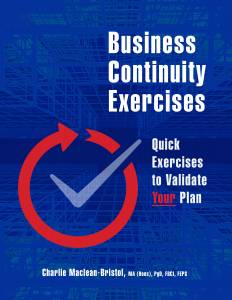Charlie Maclean-Bristol, FBCI, FEPS, discusses the devastating events unfolding in Afghanistan 2021 and what we need to learn from this as business continuity professionals
I have been watching the events unfold in Afghanistan over the last couple of weeks with the Taliban taking over the country, the air evacuation taking place and yesterday, the two suicide bomber attacks that have killed over 90 people including 13 USA service people. As Afghanistan is the lead story for every news bulletin at the moment, I thought I should share some thoughts with you all on what we can learn from these events.
Failure of intelligence and horizon scanning
We have talked often about the need to horizon scan and to try and hopefully identify the next incident before it manifests itself so that your organisation has some time to prepare before it affects you. When COVID started there were some companies that identified the threat early and who were able to prepare for it. I was speaking to someone from DHL recently who said that they managed to prepare and conduct exercises prior to COVID arriving in the UK.
The collapse of the Afghanistan Government and the rapid takeover of the country caught many intelligence agencies and their masters unaware. They were left scrambling around for a response and trying to organise an airlift for citizens, those who had worked for western forces, and those who were at risk from Taliban reprisals. If intelligence agencies who spent millions or even billions of dollars or pounds on intelligence fail to identify a major threat, what hope do we have as business continuity people with limited budget and two-hour horizon scanning meetings every quarter? This lends credence to the idea which we have often talked about of having generic plans in place which can deal with any incident. If we haven’t got a contingency already prepared, then at least we have the appropriate people in the incident team who are able to put one together on the spot. Which, incidentally, it seems like what the USA, UK and other countries evacuating their nationals have had to do.
Learning from lessons in the past
One of the things I am proud of at PlanB Consulting is bringing in new people to the profession either as graduates or as allied professionals and teaching them business continuity. I have been interviewing for new staff over the past few months. One of the questions which I ask candidates is “what do you do to keep yourself up to date with the latest thinking on business continuity?” and I am usually disappointed by the level to which people do this. This is their preferred profession and I feel they should take some interest in it beyond the normal 9-5 work.
Anyone who has read the history of Afghanistan knows that foreign forces usually fair very badly when they invade the country from Alexander the Great to Genghis Khan and the Soviet Union in the 1990s In the 19th Century Britain suffered one of the greatest defeats in 1842 when over 16000 British and Indian Troops their families workmen servants and camp followers retreated from Kabul to march the 90 miles to the safety of Jalalabad During the march they were harried by Afghans and in the end they were all massacred except for surgeon William Brydon and with a handful of Indian sepoys. I read that a picture of the retreat was prominently positioned in one of the officers’ messes in Afghanistan to remind the British troops of the fate of those who went before.
When British forces went into Helmand province in 2006 where the majority of British casualties occurred, John Reid, the then UK Secretary of Defence, said We’re in the south to help and protect the Afghan people to reconstruct their economy and democracy. We would be perfectly happy to leave in three years’ time without firing one shot.” He obviously wasn’t a student of history. Reports after incidents and disasters are littered with recommendations and comments of lessons from previous disasters not being learned, but only if you read the reports and know what went on before can we implement the recommendations now and ensure that the same lessons don’t have to be learnt again and again.
Don’t forget those affected from the devastating events unfolding in Afghanistan
Watching the events unfold in Afghanistan and the takeover of the country by the Taliban must be a bitter pill for those who served there, have ongoing injuries both physical and psychological, or who had loved ones killed. I didn’t serve there myself but lots of my contemporaries and friends did. I am not sure whether they are happy to talk about their experiences and feelings in light of the Taliban takeover which they fought to prevent.
During incidents, it is too easy to concentrate on the casualties and forget the psychological impact of people who have been caught up in the incident. This can range from the trauma of being a survivor, being involved in an incident where they could have been killed, witness to death or injury of others, or the event may have taken them back to the trauma of an event somewhere in their past. We need to identify these people and then make sure that someone within our incident response is designated to look after them and ensure that they get appropriate support guidance and information and their possible trauma is recognised.
If business continuity is our preferred profession we should be constantly reading and educating ourselves There are so many ways to consume learning from YouTube podcasts webinars papers articles and reports and so we should be all dedicating some time to this whether it is in work time or our own time We owe it to those who it is our job to plan for to be the best and as educated as we can be.
This article was originally published by BC Training Ltd.
Charlie Maclean-Bristol is the author of the new book, Business Continuity Exercises: Quick Exercises to Validate Your Plan
 “Charlie drives home the importance of continuing to identify lessons from real-life incidents and crises, but more importantly how to learn the lessons and bring them into our plans. Running an exercise, no matter how simple, is always an opportunity to learn.” – Deborah Higgins, Head of Cabinet Office, Emergency Planning College, United Kingdom
“Charlie drives home the importance of continuing to identify lessons from real-life incidents and crises, but more importantly how to learn the lessons and bring them into our plans. Running an exercise, no matter how simple, is always an opportunity to learn.” – Deborah Higgins, Head of Cabinet Office, Emergency Planning College, United Kingdom

